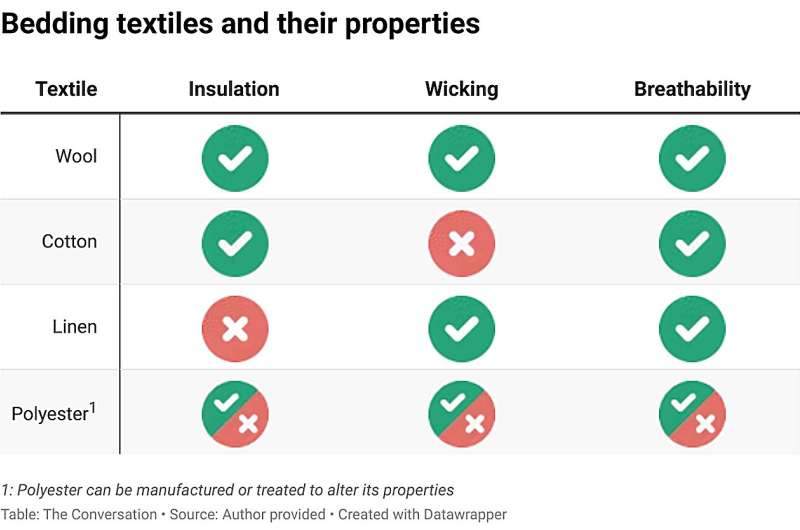
It’s winter, so many of us will be bringing out, or buying, winter bedding. But how much of a difference does your bedding make to your thermal comfort? Can a particular textile help you sleep? Is it wool, or other natural fibers, such as cotton? How about polyester? With so much choice, it’s easy to be confused.
Here’s what we found when we reviewed the evidence—not just for winter, but also for the summer ahead.
The importance of bedding
We rely on our bedding to maintain a comfortable temperature to help us sleep. And the right textiles can help regulate our body temperature and wick away moisture from sweat, promoting better sleep.
In the cooler months, we’re mainly concerned about a textile’s insulation properties—keeping body heat in and the cold out. As the temperature climbs, we’re less concerned about insulation and more concerned about wicking away moisture from sweat.
Another factor to consider is a textile’s breathability—how well it allows air to pass through it. A breathable textile helps keep you cool, by allowing warmth from your body to escape. It also helps keep you comfortable by preventing build-up of moisture. By releasing excess heat and moisture, a breathable textile makes it feel cooler and more comfortable against the skin.
Different textiles have different properties
Some textiles are better than others when it comes to insulation, wicking away moisture or breathability.
For instance, cotton and wool have tiny air pockets that act as insulation to provide warmth in cold weather. Thicker fabrics with more air pockets tend to be warmer, softer and more breathable. But these factors are also affected by the type of fiber, the weave of the fabric and the manufacturing process.
Cotton and wool are also breathable fabrics, meaning they help regulate temperature.

While cotton absorbs moisture (sweat) from your skin, it doesn’t wick it away efficiently. This retained moisture can make cotton feel clingy and uncomfortable, potentially leading to chills in warm weather.
But wool is highly absorbent and wicks moisture effectively. In warmer weather, when we sweat, wool fibers allow for airflow and moisture transfer, promoting efficient sweat evaporation and cooling, and preventing overheating. So wool (in different thicknesses) can be a good option in both summer and winter.
Linen, although breathable and having moisture-wicking properties, provides less insulation than wool and cotton due to its hollow fibers. This makes linen less effective for keeping warm in winter but is effective for keeping cool in summer.
Polyester is a synthetic fiber that can be made to trap air for insulation, but it is not naturally breathable. Usually, it absorbs moisture poorly. So it can trap sweat next to the skin, causing discomfort. However, polyester can be specially treated to help control moisture from sweat.
Which sheets help you sleep?
As part of our review, we couldn’t find any studies that directly compared sheets made from different textiles (for instance, regular cotton and flannelette) and their impact on sleep when it’s cold.
However, linen sheets are particularly effective in warmer conditions. In one study, conducted at 29°C and high humidity, linen sheets promoted less wakefulness and fewer stages of light sleep than cotton sheets.
How about doonas?
If you don’t heat your bedroom at night in winter, a goose down doona (one made from fine, goose feathers) might be an option.
These promoted the longest, deep-sleep, followed by duck down, then cotton when sleeping at 11°C. This may be because down offers better insulation (by trapping more air) than cotton. Down also has lower thermal conductivity than cotton, meaning it’s better at keeping warmth in.
Choosing between a wool or polyester doona? In a wool-industry funded study two of us (Chow and Halaki) co-authored, there wasn’t much difference. The study in young adults found no significant difference on sleep at 17°C or 22°C.
So how do I choose?
The choice of bedding is highly individual. What feels comfortable to one person is not the same for the next. That’s because of variations in body size and metabolic rate, local climate, bedroom temperature and building insulation. These can also affect sleep.
This variability, and a wide range of study designs, also makes it hard to compare different studies about the impact of different textiles on sleep. So you might need to experiment with different textiles to discover what works for you.
This article is republished from The Conversation under a Creative Commons license. Read the original article.![]()
Citation:
Why can’t I sleep? It could be your sheets or doona (2024, June 22)
retrieved 22 June 2024
from https://medicalxpress.com/news/2024-06-sheets-doona.html
This document is subject to copyright. Apart from any fair dealing for the purpose of private study or research, no
part may be reproduced without the written permission. The content is provided for information purposes only.


